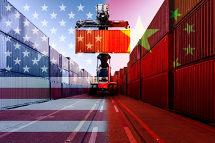Trade compliance programs save manufacturers of goods with overseas supply chains thousands of dollars in duties, fines, and penalties.

Failure to have a strong global trade compliance program can result in increased legal exposure, potentially leading to fines and penalties.
According to a 2019 federal study, President Donald Trump’s tariffs and subsequent retaliation by targeted countries have resulted in higher costs for U.S. manufacturers. “The [study] results indicate that the tariffs, thus far, have not led to increased activity in the U.S. manufacturing.”
Add to that the global pandemic and the worldwide economic slowdown, and it is apparent that manufacturers across all industries must look for cost-saving measures wherever they can.
Many companies may not realize that critical savings can be found through better compliance programs.
Global manufacturers should aim for comprehensive trade compliance as a risk-mitigation measure as well as a positive value proposition.
A strong compliance program can provide employees with the tools they need to ensure they are keeping costs like duties as low as possible in order to improve the company’s bottom line. For example, procedures designed to ensure products are assigned the appropriate Harmonized Tariff Schedule of the United States (HTSUS) classification and country of origin can help your company mitigate these additional costs and avoid fines for errors. A comprehensive program can also ensure that the special rules and exclusions associated with “Section 301” duties on products from China are applied correctly in order to take advantage of opportunities to avoid high tariffs.
On the other hand, failure to have a strong compliance program can result in increased legal exposure, potentially leading to fines and penalties. For example, a proactive compliance program might have protected importer Pure Circle U.S.A., Inc. from a nearly $600,000 penalty imposed by the U.S. Customs and Border Protection for entering a sweetener manufactured in China with prison labor.
Compliance violations and the lack of a compliance program damage companies’ reputations and hinder business opportunities. As investigations and violation enforcements increase, investors are conducting more extensive due diligence –through extensive screenings of employees and customers, as well as audits of company records– to ensure their investment does not carry compliance liability.
The U.S. Department of the Treasury’s Office of Foreign Assets Control (OFAC) encourages organizations subject to U.S. jurisdiction to “employ a risk-based approach to sanctions compliance.”
Compliance procedures should be based on who is part of your international supply chain. U.S. entities run the risk of fines and penalties if they use suppliers that do business with countries like Iran, North Korea, Cuba, and even China. A restricted-party screening process should be a part of your regular compliance procedures in order to flag any entities included on the U.S. government’s various lists of “restricted” entities and persons who pose threats to United States national security.
Engaging in the global supply chain is crucial for maintaining a competitive business. However, without a deep understanding of product classification and export controls, your business could be at risk.
Licenses are required to export certain items. Whether a license is needed is determined using a product’s Export Control Classification Number (ECCN). The Department of Commerce classifies items under ECCNs based on the nature of the product and its technical parameters. A key to determining whether an export license is needed is knowing whether the item appears on the Commerce Control List. Products that do not have an ECCN and do not appear on the U.S. Munitions List are designated EAR99, but even EAR99 products are prohibited from going to sanctioned destinations.
You must also be aware of the risk associated with a “deemed export”: a release of technology or source code to a foreign person in the United States. If you release technology to someone from a sanctioned or restricted country, you could be liable.
If your company has not invested in a compliance program, it should–the sooner, the better.
Effective compliance programs are predicated on five essential components: management commitment, risk assessment, internal controls, testing and auditing, and training.
Your trade compliance policy and procedures should:
Now more than ever, government offices and agencies are providing industry with guidance on how best to comply with trade regulations. The U.S. Department of Justice released updated guidance in June 2020 on evaluations of corporate compliance programs.
With all this information available, companies no longer can claim ignorance and must take preventive measures to ensure compliance, mitigate risk, and provide some cover for potential violations.

Doreen M. Edelman
About the Authors:
Doreen M. Edelman chairs Lowenstein Sandler’s Global Trade & Policy practice, a unique team that combines global trade and policy expertise with cross-border M&A, technology, government contracts, white collar investigations, and business counseling practices to help clients develop strategies to minimize global business risks, increase compliance with U.S. requirements, and mitigate matters raised by U.S. regulatory agencies and the U.S. Department of Justice. Her practice focuses on both commercial/technology- and defense-related export controls and supply chain import matters, including the legal requirements for compliance with the ever-evolving sanctioned-countries programs limiting business transactions with, for example, Syria, Iran, Cuba, North Korea, Russia/Crimea, and Venezuela.
Contact:
+1 202.753.3808
dedelman@lowenstein.com

Andrew Bisbas
Andrew Bisbas is an associate in Lowenstein Sandler’s Global Trade & Policy group. Andrew counsels domestic and foreign clients on a broad array of import issues including product HTSUS classifications, country of origin determinations, supply chain tariff rate optimization, trade agreement implications, and Section 301 duty mitigation. Andrew also advises clients regarding export controls and U.S. economic sanctions.
Contact:
+1 202.753.3807
abisbas@lowenstein.com
Scott Ellyson, CEO of East West Manufacturing, brings decades of global manufacturing and supply chain leadership to the conversation. In this episode, he shares practical insights on scaling operations, navigating complexity, and building resilient manufacturing networks in an increasingly connected world.